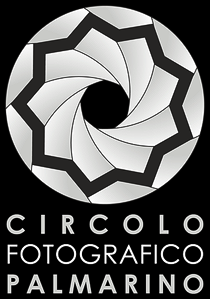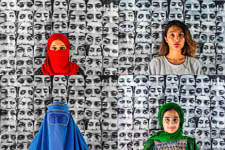 |
1. Judgement -Zohre Mussakhan |
 Non giudicateci in base a ciò che indossiamo, ma in base a ciò che siamo. Non giudicateci in base a ciò che indossiamo, ma in base a ciò che siamo. |
 Do not judge us by what we wear but by what we are like. Do not judge us by what we wear but by what we are like. |
 Beurteilt uns nicht nach der Kleidung, die wir tragen, sondern nach dem wie wir wirklich sind. Beurteilt uns nicht nach der Kleidung, die wir tragen, sondern nach dem wie wir wirklich sind. |
|
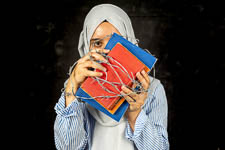 |
2. Education – Shabana Zahir |
 Sono Shabana, sono nata in Afghanistan, dove le donne non possono studiare. Io sono stata fortunata, ho studiato in India. Ma ora la mia istruzione è prigioniera assieme a me. Sono Shabana, sono nata in Afghanistan, dove le donne non possono studiare. Io sono stata fortunata, ho studiato in India. Ma ora la mia istruzione è prigioniera assieme a me. |
 I am Shabana, I was born in Afghanistan, where women are not allowed to study at school. I was lucky, I was able to study in India. But now my education is imprisoned as I am. I am Shabana, I was born in Afghanistan, where women are not allowed to study at school. I was lucky, I was able to study in India. But now my education is imprisoned as I am. |
 Ich bin Shabana. Ich bin in Afganistan geboren, wo Frauen nicht in die Schule gehen dürfen. Ich hatte Glück, ich bsuchte eine Schule in Indien. Aber jetzt ist meine Bildung so wie ich gefangen. Ich bin Shabana. Ich bin in Afganistan geboren, wo Frauen nicht in die Schule gehen dürfen. Ich hatte Glück, ich bsuchte eine Schule in Indien. Aber jetzt ist meine Bildung so wie ich gefangen. |
|
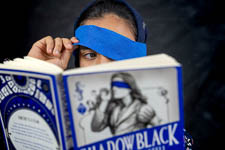 |
3. Hope – Mobina Sarvari |
 Sono Mobina, ho 14 anni e non ho mai potuto studiare. La mia speranza, un giorno, è riuscire a leggere un libro. Sono Mobina, ho 14 anni e non ho mai potuto studiare. La mia speranza, un giorno, è riuscire a leggere un libro. |
 I am Mobina, I am 14 years old and I never had the chance to study. I hope that one day I will be able to read a book. I am Mobina, I am 14 years old and I never had the chance to study. I hope that one day I will be able to read a book. |
 Ich bin Mobina. Ich bin 14 Jahre alt und ich durfte nie zur Schule gehen und lernen. Ich hoffe, dass ich eines Tages in der Lage bin, ein Buch zu lesen. Ich bin Mobina. Ich bin 14 Jahre alt und ich durfte nie zur Schule gehen und lernen. Ich hoffe, dass ich eines Tages in der Lage bin, ein Buch zu lesen. |
|
 |
4. That is not my home – Sariya Wakili |
 Sono Sariya e questa è la casa che mi è stata assegnata. Ma non è “casa”. Sono Sariya e questa è la casa che mi è stata assegnata. Ma non è “casa”. |
 I am Sariya and this is the house which was given to me. But it’s not a “home”. I am Sariya and this is the house which was given to me. But it’s not a “home”. |
 Ich bin Sariya and dieses Haus ist mir zugewiesen worden. Aber es ist kein “Zuhause”. Ich bin Sariya and dieses Haus ist mir zugewiesen worden. Aber es ist kein “Zuhause”. |
|
 |
5. Childhood dreams – Hebdrin Abdulrahman |
 Sono arrivata al campo dopo un lunghissimo viaggio a piedi. Da grande voglio fare l’astronauta, per poter viaggiare ancora più lontano. Guarderò la terra da lassù e non dovrò più fuggire. Sono arrivata al campo dopo un lunghissimo viaggio a piedi. Da grande voglio fare l’astronauta, per poter viaggiare ancora più lontano. Guarderò la terra da lassù e non dovrò più fuggire. |
 I arrrived at the refugee camp after a very long journey on foot. When I grow up I want to be an astronaut to travel further away. From up there I will look at the earth and I will not have to flee anymore. I arrrived at the refugee camp after a very long journey on foot. When I grow up I want to be an astronaut to travel further away. From up there I will look at the earth and I will not have to flee anymore. |
 Ich bin nach einer langen Reise zu Fuss im Flüchtlingslager angekommen. Ich möchte gern Astronautin werden, um sehr weit weg reisen zu kὅnnen. Von dort oben werde ich auf die Erde schauen und ich werde nicht mehr flüchten müssen. Ich bin nach einer langen Reise zu Fuss im Flüchtlingslager angekommen. Ich möchte gern Astronautin werden, um sehr weit weg reisen zu kὅnnen. Von dort oben werde ich auf die Erde schauen und ich werde nicht mehr flüchten müssen. |
|
 |
6. Freedom is not free – Zohre Mussakhan |
 Portare il velo è una prigione, se non lo vuoi indossare. Ma se toglierlo diventa un obbligo, è solo una nuova prigione. Portare il velo è una prigione, se non lo vuoi indossare. Ma se toglierlo diventa un obbligo, è solo una nuova prigione. |
 Being forced to wear the headscarf is like being in a prison if you don’t want to wear it. But it is also like being in a prison if you are forced to remove it. Being forced to wear the headscarf is like being in a prison if you don’t want to wear it. But it is also like being in a prison if you are forced to remove it. |
 Den Schleier tragen zu müssen bedeutet Gefängnis, wenn man ihn nicht tragen will. Aber gezwungen zu werden, den Schleier abzunehmen ist ein neues Gefängnis. Den Schleier tragen zu müssen bedeutet Gefängnis, wenn man ihn nicht tragen will. Aber gezwungen zu werden, den Schleier abzunehmen ist ein neues Gefängnis. |
|
 |
7. Time – Masoumeh Tajik |
 Quando entri nel campo il tempo si ferma, perché non sai quando potrai uscire. Sei incatenata a un orologio che non ha lancette. Quando entri nel campo il tempo si ferma, perché non sai quando potrai uscire. Sei incatenata a un orologio che non ha lancette. |
 When you enter the refugee camp time stops because you don’t know when you are allowed to leave it. It feels like being chained to a clock without any hands. When you enter the refugee camp time stops because you don’t know when you are allowed to leave it. It feels like being chained to a clock without any hands. |
 Wenn man ins Flüchtlingslager kommt, steht die Zeit still, weil man nicht weiss, wann man es wieder verlassen darf. Es ist als sei man an eine Uhr ohne Zeiger gefesselt. Wenn man ins Flüchtlingslager kommt, steht die Zeit still, weil man nicht weiss, wann man es wieder verlassen darf. Es ist als sei man an eine Uhr ohne Zeiger gefesselt. |
|
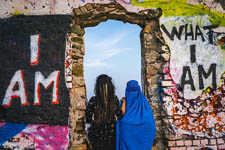 |
8. I am what I am – Masoumeh Tajik |
 Non giudicateci in base a ciò che indossiamo, ma in base a ciò che siamo. Non giudicateci in base a ciò che indossiamo, ma in base a ciò che siamo. |
 Do not judge us by to what we wear but by who we are like. Do not judge us by to what we wear but by who we are like. |
 Beurteilt uns nicht nach der Kleidung, die wir tragen, sondern danach wie wir wirklich sind. Beurteilt uns nicht nach der Kleidung, die wir tragen, sondern danach wie wir wirklich sind. |
|
 |
9. This is what I have and what I am – Masoumeh Mosawi |
 Sono Masoumeh e in questa valigia c’è tutto ciò che ho e tutto ciò che sono. La foto di mio padre, morto in Afghanistan, la foto di mia madre, morta in viaggio. E il Corano, la mia fede. Sono Masoumeh e in questa valigia c’è tutto ciò che ho e tutto ciò che sono. La foto di mio padre, morto in Afghanistan, la foto di mia madre, morta in viaggio. E il Corano, la mia fede. |
 I am Masoumeh and in this suitcase there is everything I own and everything I am. The photo of my father who died in Afghanistan, the photo of my mother who died during the journey. And the Koran, my faith. I am Masoumeh and in this suitcase there is everything I own and everything I am. The photo of my father who died in Afghanistan, the photo of my mother who died during the journey. And the Koran, my faith. |
 Ich bin Masoumeh und in diesem Koffer ist alles , was ich besitze and alles, was ich bin. Das Foto von meinem Vater, der in Afghanistan gestorben ist , das Foto von meiner Mutter, die auf der Reise hierher gestorben ist, und der Koran, mein Glaube. Ich bin Masoumeh und in diesem Koffer ist alles , was ich besitze and alles, was ich bin. Das Foto von meinem Vater, der in Afghanistan gestorben ist , das Foto von meiner Mutter, die auf der Reise hierher gestorben ist, und der Koran, mein Glaube. |
|
 |
10. Strenght – Farzana Naeemi |
 Le mani nere sono il mio passato, le mani bianche il mio futuro. Indissolubilmente intrecciate. Le mani nere sono il mio passato, le mani bianche il mio futuro. Indissolubilmente intrecciate. |
 The black hands are my past, the white ones my future. They are inextricably connected. The black hands are my past, the white ones my future. They are inextricably connected. |
 Die schwarzen Hände sind meine Vergangenheit, die weissen Hände sind meine Zukunft. Sie sind untrennbar miteinander verbunden. Die schwarzen Hände sind meine Vergangenheit, die weissen Hände sind meine Zukunft. Sie sind untrennbar miteinander verbunden. |
|
 |
11. Princess without a land – Sariya Wakili |
 Sono Sariya e sono curda, nel campo mi sono sempre distinta per la mia grazia e la mia eleganza. Dentro mi sento una principessa. Sono Sariya e sono curda, nel campo mi sono sempre distinta per la mia grazia e la mia eleganza. Dentro mi sento una principessa.
Una Principessa senza nessun regno. |
 I am Sariya and I am Kurdish. In the refugee camp I always stood out for my grace and my elegance. I feel like a princess, a princess without a kingdom. I am Sariya and I am Kurdish. In the refugee camp I always stood out for my grace and my elegance. I feel like a princess, a princess without a kingdom. |
 Ich bin Sariya und ich bin Kurdin. Im Flüchtlingslager stach ich immer hervor durch meine Anmut und meine Eleganz. Ich fühle mich wie eine Prinzessin, eine Prinzessin ohne ein Königreich. Ich bin Sariya und ich bin Kurdin. Im Flüchtlingslager stach ich immer hervor durch meine Anmut und meine Eleganz. Ich fühle mich wie eine Prinzessin, eine Prinzessin ohne ein Königreich. |
|
 |
12. Portait of a self-portrait – Kowsar Hur |
 Al corso di pittura nel campo mi hanno chiesto di fare un autoritratto. Questa sono io: Kowsar. Al corso di pittura nel campo mi hanno chiesto di fare un autoritratto. Questa sono io: Kowsar. |
 During the art classes in the camp they asked me to draw a self-portrait. This is me: Kowsar. During the art classes in the camp they asked me to draw a self-portrait. This is me: Kowsar. |
 Während des Kunstunterrichts im Flüchtlingslager hat man mir die Aufgabe erteilt, ein Selbstporträt zu erstellen. Das bin ich: Kowsar. Während des Kunstunterrichts im Flüchtlingslager hat man mir die Aufgabe erteilt, ein Selbstporträt zu erstellen. Das bin ich: Kowsar. |
|
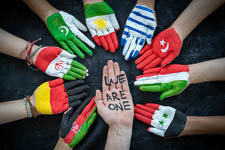 |
13. We are one – Masoumeh Tajik |
 Nel campo abbiamo trovato amicizia e condivisione: tante mani, un’anima sola. Nel campo abbiamo trovato amicizia e condivisione: tante mani, un’anima sola. |
 In the refugee camp we found friendship and sharing: lots of hands, just one soul. In the refugee camp we found friendship and sharing: lots of hands, just one soul. |
 Im Flüchtlingslager haben wir Freunschaft und Teilen gefunden: viele Hände, eine einzige Seele. Im Flüchtlingslager haben wir Freunschaft und Teilen gefunden: viele Hände, eine einzige Seele. |
|
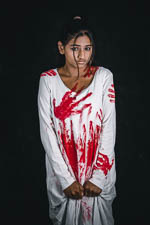 |
14. Don’t touch me – Neha Zeeshan |
 Sono Neha, promessa sposa a mio cugino. Non voglio diventare una sposa bambina: don’t touch me! Sono Neha, promessa sposa a mio cugino. Non voglio diventare una sposa bambina: don’t touch me! |
 I am Neha, betrothed to my cousin. I don’t want to be a child bride: don’t touch me. I am Neha, betrothed to my cousin. I don’t want to be a child bride: don’t touch me. |
 Ich bin Neha, zukünftige Braut meines Cousins. Ich will keine Kindsbraut werden: fasst mich nicht an. Ich bin Neha, zukünftige Braut meines Cousins. Ich will keine Kindsbraut werden: fasst mich nicht an. |
|
 |
15. We are not all on the same boat – Masoumeh Tajik |
 Siamo arrivate dal mare, ma la nostra barca si è arenata in mezzo all’erba del campo. Non ci ha portato in nessun luogo. Siamo arrivate dal mare, ma la nostra barca si è arenata in mezzo all’erba del campo. Non ci ha portato in nessun luogo. |
 We arrived from the sea, but our boat ran aground in the grass of the camp. It took us to nowhere. We arrived from the sea, but our boat ran aground in the grass of the camp. It took us to nowhere. |
 Wir sind vom Meer gekommen, aber unser Boot ist im Gras des Flüchtlingslagers gestrandet. Es hat uns nirgendwohin gebracht. Wir sind vom Meer gekommen, aber unser Boot ist im Gras des Flüchtlingslagers gestrandet. Es hat uns nirgendwohin gebracht. |
|
 |
16. I’m leaving after 4 years inside the camp – Sariya Wakili |
 Sono Sariya e questo è il mio lasciapassare. Ogni linea che ho cancellato è una settimana di vita nel campo. Ho cancellato quattro anni di vita: ora posso partire. Sono Sariya e questo è il mio lasciapassare. Ogni linea che ho cancellato è una settimana di vita nel campo. Ho cancellato quattro anni di vita: ora posso partire. |
 I am Sariya and this is my pass. Every line I draw represents one week of my life in the camp. I draw four years of my life: now I can leave. I am Sariya and this is my pass. Every line I draw represents one week of my life in the camp. I draw four years of my life: now I can leave. |
 Ich bin Sariya und das ist mein Pass. Jeder Strich, den ich gezogen habe, steht für eine Woche Leben im Flüchtlingslager. Ich habe vier Lebensahre versäumt: jetzt kann ich gehen. Ich bin Sariya und das ist mein Pass. Jeder Strich, den ich gezogen habe, steht für eine Woche Leben im Flüchtlingslager. Ich habe vier Lebensahre versäumt: jetzt kann ich gehen. |
|
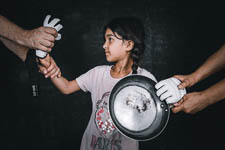 |
17. They told me my place is in the kitchen |
 Mi avevano detto che il mio posto è in cucina, le donne non possono combattere… Mi avevano detto che il mio posto è in cucina, le donne non possono combattere… |
 I was told that my place was the kitchen, women cannot fight… I was told that my place was the kitchen, women cannot fight… |
 Man sagte mir, dass mein Platz in der Küche sei, Frauen dürfen nicht kämpfen… Man sagte mir, dass mein Platz in der Küche sei, Frauen dürfen nicht kämpfen… |
|
 |
18. …but I did it – Yehganeh Esmailyan |
 …ma io ho lottato contro i pregiudizi. E ho vinto. …ma io ho lottato contro i pregiudizi. E ho vinto. |
…but I fought against prejudices, and I have won. |
 …aber ich habe gegen Vorurteile gekämpft und ich habe gewonnen. …aber ich habe gegen Vorurteile gekämpft und ich habe gewonnen. |
|
 |
19. Locked – Zohre Mussakhan |
 Sono in prigione? Sono in prigione? |
Am I in a prison?  |
Bin ich in einem Gefängnis? |
|
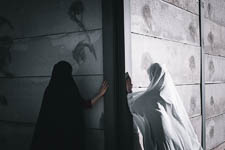 |
20. Darkness and light – Masoumeh Tajik |
 Il velo nero, la costrizione. Il velo bianco, la scelta. Il velo nero, la costrizione. Il velo bianco, la scelta. |
 The black veil means constraint, the white one free choice. The black veil means constraint, the white one free choice. |
 Der schwarze Schleier steht für Zwang, der weiβe für freie Wahl. Der schwarze Schleier steht für Zwang, der weiβe für freie Wahl. |
|
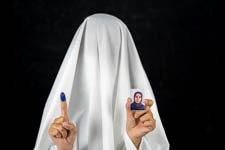 |
21. I have no identity – Zohre Mussakhan |
 Sono Zohre, ma non posso mostrarvi il mio volto. La mia identità è un’impronta digitale. Sono Zohre, ma non posso mostrarvi il mio volto. La mia identità è un’impronta digitale. |
 I am Zohre, but I cannot show you my face. My identity is just a fingerprint. I am Zohre, but I cannot show you my face. My identity is just a fingerprint. |
 Ich bin Zohre, aber ich darf Ihnen nicht mein Gesicht zeigen. Meine Identität ist ein Fingerabdruck. Ich bin Zohre, aber ich darf Ihnen nicht mein Gesicht zeigen. Meine Identität ist ein Fingerabdruck. |
|
 |
22. Men build walls, we plant trees – Sedigeth |
 Le autorità greche hanno utilizzato i fondi della comunità europea per costruire un muro attorno al campo. Non potevamo più vedere gli alberi, al di là del muro. Loro hanno costruito mura, noi abbiamo piantato alberi. Le autorità greche hanno utilizzato i fondi della comunità europea per costruire un muro attorno al campo. Non potevamo più vedere gli alberi, al di là del muro. Loro hanno costruito mura, noi abbiamo piantato alberi. |
 The Greek authorities used the funds of the European Community to build a wall around the camp. So we could no longer see the trees beyond the wall. They built the wall, we planted trees. The Greek authorities used the funds of the European Community to build a wall around the camp. So we could no longer see the trees beyond the wall. They built the wall, we planted trees. |
 Die Behörden in Griechenland haben die Gelder der Europäischen Gemeinschaft verwendet, um eine Mauer um das Lager zu bauen. Wir konnten die Bäume auf der anderen Seite der Mauer nicht mehr sehen. Sie bauten Mauern, wir pflanzten Bäume. Die Behörden in Griechenland haben die Gelder der Europäischen Gemeinschaft verwendet, um eine Mauer um das Lager zu bauen. Wir konnten die Bäume auf der anderen Seite der Mauer nicht mehr sehen. Sie bauten Mauern, wir pflanzten Bäume. |
|
 |
23. How dare you? – Yehganeh Esmailyan |
 Sono Yehganeh, e sono una donna, perciò non mi è permesso parlare, non devo osare pensare. Sono Yehganeh, e sono una donna, perciò non mi è permesso parlare, non devo osare pensare. |
 I am Yehganeh and I am a woman and that’s why I am not allowed to speak, I must not dare to think. I am Yehganeh and I am a woman and that’s why I am not allowed to speak, I must not dare to think. |
 Ich bin Yehganeh und ich bin eine Frau, deswegen darf ich nicht sprechen, ich darf es nicht wagen zu denken. Ich bin Yehganeh und ich bin eine Frau, deswegen darf ich nicht sprechen, ich darf es nicht wagen zu denken. |
|
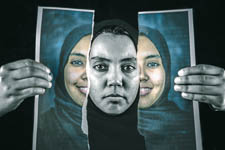 |
24. How they see me, how I am – Zohre Musskhan |
 Sono Zohre e ho tanti colori dentro di me. Ma il volto che devo mostrare agli altri è in bianco e nero. Sono Zohre e ho tanti colori dentro di me. Ma il volto che devo mostrare agli altri è in bianco e nero. |
 I am Zohre and I have many colors inside me. But the face I have to show to others is black and white. I am Zohre and I have many colors inside me. But the face I have to show to others is black and white. |
 Ich bin Zohre und ich habe viele Farben in mir. Aber das Gesicht, dass ich den anderen zeigen muss, ist schwarz – weiβ. Ich bin Zohre und ich habe viele Farben in mir. Aber das Gesicht, dass ich den anderen zeigen muss, ist schwarz – weiβ. |
|
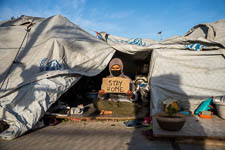 |
25. Stay home – Masoumhe Tajik |
 Per noi non c’era ancora posto nel campo, così ci siamo attendati fuori. Anche noi, come tutti, durante il lockdown siamo rimasti a “casa”. Per noi non c’era ancora posto nel campo, così ci siamo attendati fuori. Anche noi, come tutti, durante il lockdown siamo rimasti a “casa”. |
 There wasn’t any place yet for us in the camp, so we were housed in tends outside. During the lockdown we, like everybody else, stayed “at home”. There wasn’t any place yet for us in the camp, so we were housed in tends outside. During the lockdown we, like everybody else, stayed “at home”. |
 Für uns war noch kein Platz im Flüchtlingslager, so wurden wir in Zelten untergebracht. Während des Lockdowns sind wir, wie alle anderen auch “zu Hause”geblieben. Für uns war noch kein Platz im Flüchtlingslager, so wurden wir in Zelten untergebracht. Während des Lockdowns sind wir, wie alle anderen auch “zu Hause”geblieben. |
|
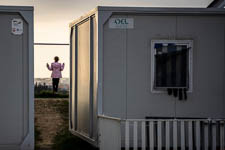 |
26. Another world – Shabana Zahir |
 Stasera è bello il tramonto, di là dalla rete. Stasera è bello il tramonto, di là dalla rete. |
 Tonight the sunset, beyond the the net of fencing, is beautiful. Tonight the sunset, beyond the the net of fencing, is beautiful. |
 Heute ist der Sonnenuntergang wunderschön jenseits des Zaunes. Heute ist der Sonnenuntergang wunderschön jenseits des Zaunes. |
|
 |
27. But her fly – Hosnia Sadat |
 Sono Hosnia ed è la prima volta che mi tolgo il velo. Ho scelto il mio preferito: quello con le farfalle. Sono Hosnia ed è la prima volta che mi tolgo il velo. Ho scelto il mio preferito: quello con le farfalle. |
 I am Hosnia and this is the first time I take off the veil. I have chosen the one I like best: the one with the butterflies. I am Hosnia and this is the first time I take off the veil. I have chosen the one I like best: the one with the butterflies. |
 Ich bin Hosnia und zum ersten Mal nehme ich den Schleier ab. Ich entschied mich für meinen Lieblingsschleier: den mit den Schmetterlingen. Ich bin Hosnia und zum ersten Mal nehme ich den Schleier ab. Ich entschied mich für meinen Lieblingsschleier: den mit den Schmetterlingen. |
|
 |
28. My family – Zeinab |
 Io sono Zeinab, di etnia Hazara, e ne sono orgogliosa. Guardate la magnificenza dei nostri costumi. Forse è per invidia se in Afghanistan siamo perseguitati. Io sono Zeinab, di etnia Hazara, e ne sono orgogliosa. Guardate la magnificenza dei nostri costumi. Forse è per invidia se in Afghanistan siamo perseguitati. |
 I am Zeinab of the the ethnic group of Hazara and I am proud of it. Admire our beautiful traditional clothes. Maybe we are persecuted in Afghanistan because people are envious of us. I am Zeinab of the the ethnic group of Hazara and I am proud of it. Admire our beautiful traditional clothes. Maybe we are persecuted in Afghanistan because people are envious of us. |
 Ich bin Zeinad von der Volksgruppe der Hazara und ich bin stolz darauf. Bewundern Sie unsere traditionellen Trachten. Vielleicht werden wir in Afghanistan aus Neid verfolgt. Ich bin Zeinad von der Volksgruppe der Hazara und ich bin stolz darauf. Bewundern Sie unsere traditionellen Trachten. Vielleicht werden wir in Afghanistan aus Neid verfolgt. |
|
 |
29. I AM NOT – Zeinab |
 Sono Zeinab e mi è stato chiesto di completare la frase “Io sono”… Ho scritto “niente”. Sono Zeinab e mi è stato chiesto di completare la frase “Io sono”… Ho scritto “niente”. |
 I am Zeinab and I was asked to complete the sentence “I am …” I wrote “nothing”. I am Zeinab and I was asked to complete the sentence “I am …” I wrote “nothing”. |
 Ich bin Zeinad und man bat mich den Satz “Ich bin…“ zu vervollständigen. Ich schrieb “nichts”. Ich bin Zeinad und man bat mich den Satz “Ich bin…“ zu vervollständigen. Ich schrieb “nichts”. |
|
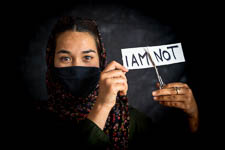 |
30. I AM – Kadijeh Rezai |
 Io invece ho scritto “sono”. Sono Kadijeh! Io invece ho scritto “sono”. Sono Kadijeh! |
I wrote “am” instead. I am Kadijeh! |
Ich dagegen schrieb ich “bin”. Ich bin Kadijeh! |
|
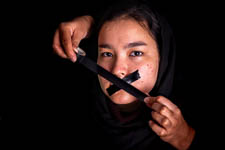 |
31. Don’t talk – Masoumeh Kavari |
 Sono Masoumeh, e sono una donna, perciò non mi è permesso parlare, non devo osare pensare. Sono Masoumeh, e sono una donna, perciò non mi è permesso parlare, non devo osare pensare. |
 I am Masoumeh and I am a woman, therefore I am not allowed to talk, I mustn’t dare to think. I am Masoumeh and I am a woman, therefore I am not allowed to talk, I mustn’t dare to think. |
 Ich bin Masoumeh und ich bin eine Frau, deshalb darf ich nicht sprechen, ich darf es nicht wagen zu denken. Ich bin Masoumeh und ich bin eine Frau, deshalb darf ich nicht sprechen, ich darf es nicht wagen zu denken. |
|
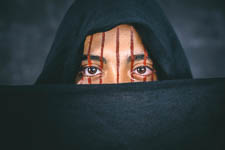 |
32. I don’t know – Mobina Sarwari |
 Sono Mobine, e mi sento dentro una prigione. La mia prigione è la mia famiglia. Sono Mobine, e mi sento dentro una prigione. La mia prigione è la mia famiglia. |
 I am Mobine, and I feel inside a prison. My prison is my family. I am Mobine, and I feel inside a prison. My prison is my family. |
 Ich bin Mobine und ich fühle mich in einem Gefängnis. Mein Gefängnis ist meine Familie. Ich bin Mobine und ich fühle mich in einem Gefängnis. Mein Gefängnis ist meine Familie. |
|
 |
33. This is not my home, is my jail – Masoumeh Tajik |
 Mi è sempre piaciuto cucinare, ma qui non ci riesco. Questa non è la mia casa, è la mia prigione. Mi è sempre piaciuto cucinare, ma qui non ci riesco. Questa non è la mia casa, è la mia prigione. |
 I used to like cooking, but here I can’t cook anymore. This is not my home, it’s my prison. I used to like cooking, but here I can’t cook anymore. This is not my home, it’s my prison. |
 Ich habe immer gerne gekocht, aber ich kann es hier nicht. Das ist nicht mein Zuhause, das ist mein Gefängnis. Ich habe immer gerne gekocht, aber ich kann es hier nicht. Das ist nicht mein Zuhause, das ist mein Gefängnis. |
|
 |
34. They stole my youth – Zohre Mussakhan |
 Sono una sposa bambina, non potrò più giocare con la mia bambola. Mi hanno rubato l’infanzia. Sono una sposa bambina, non potrò più giocare con la mia bambola. Mi hanno rubato l’infanzia. |
 I am a child bride, I will not be allowed to play with my doll. They have stolen my childhood. I am a child bride, I will not be allowed to play with my doll. They have stolen my childhood. |
 Ich bin eine Kindsbraut, ich darf nicht mehr mit meiner Puppe spielen. Sie haben mir meine Kindheit gestohlen. Ich bin eine Kindsbraut, ich darf nicht mehr mit meiner Puppe spielen. Sie haben mir meine Kindheit gestohlen. |
|
 |
35. Badbadack – Parwana Zahir |
 Sono Parwana, quand’ero in Afghanistan facevo volare gli aquiloni. Nel campo ne ho costruito uno con stoffe colorate. Per farlo volare fuori dal muro. Sono Parwana, quand’ero in Afghanistan facevo volare gli aquiloni. Nel campo ne ho costruito uno con stoffe colorate. Per farlo volare fuori dal muro. |
 I am Parwana, when I lived in Afghanistan I used to fly kites. In the refugee camp I built one with coloured fabrics to make it fly out of the wall. I am Parwana, when I lived in Afghanistan I used to fly kites. In the refugee camp I built one with coloured fabrics to make it fly out of the wall. |
 Ich bin Parwana, als ich in Afghanistan lebte, lieβ ich immer die Drachen steigen. Im Flüchtlingslager baute ich einen mit bunten Stoffstücken, um ihn außerhalb der Mauer fliegen zu lassen. Ich bin Parwana, als ich in Afghanistan lebte, lieβ ich immer die Drachen steigen. Im Flüchtlingslager baute ich einen mit bunten Stoffstücken, um ihn außerhalb der Mauer fliegen zu lassen. |
|
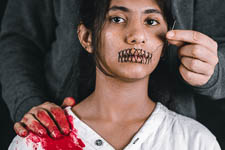 |
36. Zernadan! – Masoumeh Tajik |
 Sono una donna, perciò non mi è permesso parlare, non devo osare pensare. Sono una donna, perciò non mi è permesso parlare, non devo osare pensare. |
 I am a woman that’s why I am not allowed to speak. I mustn’t dare to think. I am a woman that’s why I am not allowed to speak. I mustn’t dare to think. |
 Ich bin eine Frau, deshalb darf ich nicht sprechen. Ich darf es nicht wagen zu denken. Ich bin eine Frau, deshalb darf ich nicht sprechen. Ich darf es nicht wagen zu denken. |
|
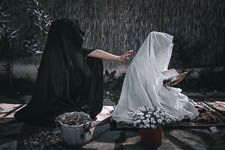 |
37. Both are me – Masoumeh Tajik |
 Il velo nero, la costrizione. Il velo bianco la libera scelta. Riuscirò a ritrovare la fede che ho perso? Il velo nero, la costrizione. Il velo bianco la libera scelta. Riuscirò a ritrovare la fede che ho perso? |
 The black veil means constraint, the white one free choice. Will I be able to regain the faith I have lost? The black veil means constraint, the white one free choice. Will I be able to regain the faith I have lost? |
 Der schwarze Schleier bedeutet Zwang, der weiβe freie Wahl. Kann ich den verlorenen Glauben wiedererlangen? Der schwarze Schleier bedeutet Zwang, der weiβe freie Wahl. Kann ich den verlorenen Glauben wiedererlangen? |
|
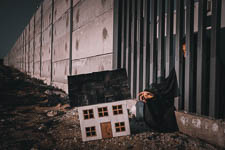 |
38. I want to go home – Masoumeh Tajik |
 Quando sono arrivata al campo ho pensato: sono a casa o ci sarò presto. Ma qui non è “casa”… Quando sono arrivata al campo ho pensato: sono a casa o ci sarò presto. Ma qui non è “casa”… |
 When I arrived at the camp I thought: I am at home or I will be soon there. But this is not “home”. When I arrived at the camp I thought: I am at home or I will be soon there. But this is not “home”. |
 Als ich im Flüchtlingslager ankam, dachte ich: Ich bin zu Hause oder ich werde es bald sein. Aber das hier ich kein ”Zuhause”. Als ich im Flüchtlingslager ankam, dachte ich: Ich bin zu Hause oder ich werde es bald sein. Aber das hier ich kein ”Zuhause”. |
|
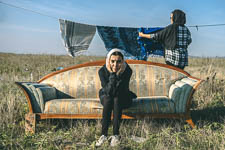 |
39. Homeless – Zohre Mussakhan |
 … qui siamo in nessun luogo. … qui siamo in nessun luogo. |
… here we are nowhere.  |
… hier sind wir nirgendwo. |
|
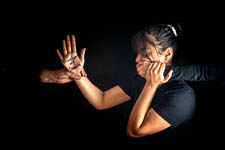 |
40. Freedom and Dreams – Zahra Hamdavy |
 Sono Zahra, sono una donna, mio padre mi ha detto che non mi è permesso parlare, non devo osare pensare. Ma io voglio sogni e libertà. Sono Zahra, sono una donna, mio padre mi ha detto che non mi è permesso parlare, non devo osare pensare. Ma io voglio sogni e libertà. |
 I am Zahra, I am a woman, my father told me that I am not allowed to speak, I mustn’t dare to think. But I want dreams and freedom. I am Zahra, I am a woman, my father told me that I am not allowed to speak, I mustn’t dare to think. But I want dreams and freedom. |
 Ich bin Zahra, ich bin eine Frau, mein Vater hat mir gesagt, dass ich nicht sprechen darf, dass ich es nicht wagen darf zu denken. Aber ich will Träume und Freiheit. Ich bin Zahra, ich bin eine Frau, mein Vater hat mir gesagt, dass ich nicht sprechen darf, dass ich es nicht wagen darf zu denken. Aber ich will Träume und Freiheit. |
|
 |
41. My family – Masoumeh Tajik |
 Avevo un padre e avevo una madre. Ora siedo da sola tra due sedie vuote. Avevo un padre e avevo una madre. Ora siedo da sola tra due sedie vuote. |
 I had a father and I had a mother. Now I am sitting here alone between two empty chairs. I had a father and I had a mother. Now I am sitting here alone between two empty chairs. |
 Ich hatte einen Vater und ich hatte eine Mutter. Jetzt sitze ich hier allein zwischen zwei leeren Stühlen. Ich hatte einen Vater und ich hatte eine Mutter. Jetzt sitze ich hier allein zwischen zwei leeren Stühlen. |
|
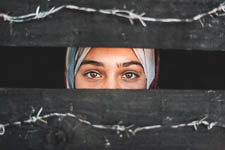 |
42. Eyes – Mahdiyeh Nejati |
 Lo sguardo. Lo sguardo. |
The look. |
Der Blick. |
|
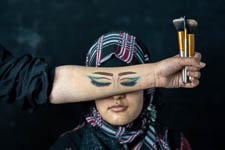 |
43. Make up my dreams – Kadijeh Rezai |
 Sono Kadijeh, e voglio diventare una truccatrice. Ma il Corano non lo permette. Così mi esercito a truccare i miei sogni sulle mie braccia. Sono Kadijeh, e voglio diventare una truccatrice. Ma il Corano non lo permette. Così mi esercito a truccare i miei sogni sulle mie braccia. |
 I am Kadijeh, and I want to be a make-up artist. But the Koran doesn’t allow it. Therefore I practice by painting my dreams on my arms. I am Kadijeh, and I want to be a make-up artist. But the Koran doesn’t allow it. Therefore I practice by painting my dreams on my arms. |
 Ich bin Kadijeh und ich möchte Maskenbildnerin werden. Aber der Koran erlaubt das nicht. Deshalb übe ich, indem ich meine Träume auf meine Arme male. Ich bin Kadijeh und ich möchte Maskenbildnerin werden. Aber der Koran erlaubt das nicht. Deshalb übe ich, indem ich meine Träume auf meine Arme male. |
|
 |
44. this dream made me survive jail – Masoumeh Kavar |
 Sono Masoumeh. Mentre fuggivo dall’Iran sono stata catturata dalla polizia turca. In cella ero il numero 2338. Pensavo: un giorno leggerò di nuovo un libro, giocherò a pallavolo, mi potrò mettere il rossetto. Così sono sopravvissuta. Sono Masoumeh. Mentre fuggivo dall’Iran sono stata catturata dalla polizia turca. In cella ero il numero 2338. Pensavo: un giorno leggerò di nuovo un libro, giocherò a pallavolo, mi potrò mettere il rossetto. Così sono sopravvissuta. |
 I am Masoumeh. The Turkish police caught me while I was fleeing from Iran. In the cell of the prison I was number 2338. I was thinking that one day I will read again a book, I will play again volleyball, I will put on lipstick. That’s how I managed to survive. I am Masoumeh. The Turkish police caught me while I was fleeing from Iran. In the cell of the prison I was number 2338. I was thinking that one day I will read again a book, I will play again volleyball, I will put on lipstick. That’s how I managed to survive. |
 Ich bin Masoumeh. Die türkische Polizei hat mich gefangengenommen, als ich aus dem Iran flüchtete. In der Gefängniszelle war ich die Nummer 2338. Ich dachte daran, dass ich eines Tages wieder ein Buch lesen würde, dass ich wieder Volleyball spielen würde, dass ich mir wieder den Lippenstift auftragen würde. Nur so habe ich es geschafft zu überleben. Ich bin Masoumeh. Die türkische Polizei hat mich gefangengenommen, als ich aus dem Iran flüchtete. In der Gefängniszelle war ich die Nummer 2338. Ich dachte daran, dass ich eines Tages wieder ein Buch lesen würde, dass ich wieder Volleyball spielen würde, dass ich mir wieder den Lippenstift auftragen würde. Nur so habe ich es geschafft zu überleben. |
|
 |
45. Broken Heart – Zohre Mussakhan |
 Ma dove sono? Ma dove sono? |
Where am I? |
Wo bin ich? |
|
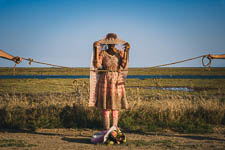 |
46. Jail forever – Farzana Naeemi |
 Il giorno del tuo matrimonio indosserai un vestito bellissimo, mi aveva detto mio padre. Invece era una prigione. Il giorno del tuo matrimonio indosserai un vestito bellissimo, mi aveva detto mio padre. Invece era una prigione. |
 On your wedding day you will wear a beautiful dress, that’s what my father told me. It was a prison instead. On your wedding day you will wear a beautiful dress, that’s what my father told me. It was a prison instead. |
 An deinem Hochzeitstag wirst du ein wunderschönes Kleid tragen, sagte mein Vater zu mir. Aber es war ein Gefängnis. An deinem Hochzeitstag wirst du ein wunderschönes Kleid tragen, sagte mein Vater zu mir. Aber es war ein Gefängnis. |
|
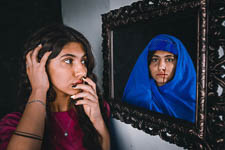 |
47. How I was, how I am – Masoumeh Tajik |
 Nel campo mi sono tolta il velo, ho imparato a truccarmi e a curarmi di me. Ma se mi guardo allo specchio vedo ancora come sarei se non fossi fuggita. Nel campo mi sono tolta il velo, ho imparato a truccarmi e a curarmi di me. Ma se mi guardo allo specchio vedo ancora come sarei se non fossi fuggita. |
 In the refugee camp I took off the veil, I learned how to make up and how to take care of myself. But if I look in the mirror I still see what I would be like if I hadn’t escaped. In the refugee camp I took off the veil, I learned how to make up and how to take care of myself. But if I look in the mirror I still see what I would be like if I hadn’t escaped. |
 Im Flüchtlingslager habe ich den Schleier abgenommen, ich habe gelernt, mich zu schminken und auf mich selbst aufzupassen. Aber wenn ich in den Spiegel schaue, sehe ich immer noch, wie ich wäre, wenn ich nicht geflüchtet wäre. Im Flüchtlingslager habe ich den Schleier abgenommen, ich habe gelernt, mich zu schminken und auf mich selbst aufzupassen. Aber wenn ich in den Spiegel schaue, sehe ich immer noch, wie ich wäre, wenn ich nicht geflüchtet wäre. |
|
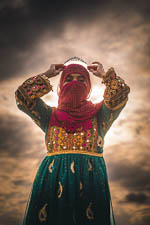 |
48.Afghan Princess – Najima Rezai |
 Sono Najima e sono afgana. Ho comprato questa coroncina al supermercato, con la tessera del campo. E mi sento una principessa. Sono Najima e sono afgana. Ho comprato questa coroncina al supermercato, con la tessera del campo. E mi sento una principessa. |
 I am Najima and I am from Afghanistan. I bought this crown at the supermarket with the camp card. I feel like a princess. I am Najima and I am from Afghanistan. I bought this crown at the supermarket with the camp card. I feel like a princess. |
 Ich bin Najima und ich bin Afghanin. Ich habe diese Krone mit der Lagerkarte im Supermarkt gekauft. Ich fühle mich wie eine Prinzessin. Ich bin Najima und ich bin Afghanin. Ich habe diese Krone mit der Lagerkarte im Supermarkt gekauft. Ich fühle mich wie eine Prinzessin. |
|
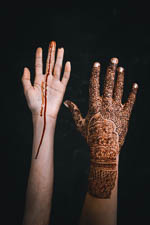 |
49. Marks – Neha Zeeshan |
 Così decorano le mani delle spose il giorno del matrimonio. L’inchiostro nasconde il sangue. Così decorano le mani delle spose il giorno del matrimonio. L’inchiostro nasconde il sangue. |
 That’ s how they decorate the hands of the brides on their wedding day. The ink hides the blood. That’ s how they decorate the hands of the brides on their wedding day. The ink hides the blood. |
 So schmücken sie die Hände der Bräute am Hochzeitstag. Die Tinte verbirgt das Blut. So schmücken sie die Hände der Bräute am Hochzeitstag. Die Tinte verbirgt das Blut. |
|
 |
50. Womens strength |
 Hanno costruito un muro attorno al campo, ci volevano imprigionare. Ma ci hanno solo insegnato a diventare più unite. Hanno costruito un muro attorno al campo, ci volevano imprigionare. Ma ci hanno solo insegnato a diventare più unite. |
 They have built a wall around the refugee camp, they wanted to imprison us. But they only taught us how to become more united. They have built a wall around the refugee camp, they wanted to imprison us. But they only taught us how to become more united. |
 Sie haben eine Mauer um das Flüchtlingslager gebaut, sie wollten uns einsperren. Aber sie haben uns nur gelehrt, vereinter zu werden. Sie haben eine Mauer um das Flüchtlingslager gebaut, sie wollten uns einsperren. Aber sie haben uns nur gelehrt, vereinter zu werden. |
|


 Sono Shabana, sono nata in Afghanistan, dove le donne non possono studiare. Io sono stata fortunata, ho studiato in India. Ma ora la mia istruzione è prigioniera assieme a me.
Sono Shabana, sono nata in Afghanistan, dove le donne non possono studiare. Io sono stata fortunata, ho studiato in India. Ma ora la mia istruzione è prigioniera assieme a me.
 Sono Mobina, ho 14 anni e non ho mai potuto studiare. La mia speranza, un giorno, è riuscire a leggere un libro.
Sono Mobina, ho 14 anni e non ho mai potuto studiare. La mia speranza, un giorno, è riuscire a leggere un libro.
 Sono Sariya e questa è la casa che mi è stata assegnata. Ma non è “casa”.
Sono Sariya e questa è la casa che mi è stata assegnata. Ma non è “casa”.
 Sono arrivata al campo dopo un lunghissimo viaggio a piedi. Da grande voglio fare l’astronauta, per poter viaggiare ancora più lontano. Guarderò la terra da lassù e non dovrò più fuggire.
Sono arrivata al campo dopo un lunghissimo viaggio a piedi. Da grande voglio fare l’astronauta, per poter viaggiare ancora più lontano. Guarderò la terra da lassù e non dovrò più fuggire.
 Portare il velo è una prigione, se non lo vuoi indossare. Ma se toglierlo diventa un obbligo, è solo una nuova prigione.
Portare il velo è una prigione, se non lo vuoi indossare. Ma se toglierlo diventa un obbligo, è solo una nuova prigione.
 Quando entri nel campo il tempo si ferma, perché non sai quando potrai uscire. Sei incatenata a un orologio che non ha lancette.
Quando entri nel campo il tempo si ferma, perché non sai quando potrai uscire. Sei incatenata a un orologio che non ha lancette.
 Non giudicateci in base a ciò che indossiamo, ma in base a ciò che siamo.
Non giudicateci in base a ciò che indossiamo, ma in base a ciò che siamo.
 Sono Masoumeh e in questa valigia c’è tutto ciò che ho e tutto ciò che sono. La foto di mio padre, morto in Afghanistan, la foto di mia madre, morta in viaggio. E il Corano, la mia fede.
Sono Masoumeh e in questa valigia c’è tutto ciò che ho e tutto ciò che sono. La foto di mio padre, morto in Afghanistan, la foto di mia madre, morta in viaggio. E il Corano, la mia fede.
 Le mani nere sono il mio passato, le mani bianche il mio futuro. Indissolubilmente intrecciate.
Le mani nere sono il mio passato, le mani bianche il mio futuro. Indissolubilmente intrecciate.
 Sono Sariya e sono curda, nel campo mi sono sempre distinta per la mia grazia e la mia eleganza. Dentro mi sento una principessa.
Sono Sariya e sono curda, nel campo mi sono sempre distinta per la mia grazia e la mia eleganza. Dentro mi sento una principessa.
 Al corso di pittura nel campo mi hanno chiesto di fare un autoritratto. Questa sono io: Kowsar.
Al corso di pittura nel campo mi hanno chiesto di fare un autoritratto. Questa sono io: Kowsar.
 Nel campo abbiamo trovato amicizia e condivisione: tante mani, un’anima sola.
Nel campo abbiamo trovato amicizia e condivisione: tante mani, un’anima sola.
 Sono Neha, promessa sposa a mio cugino. Non voglio diventare una sposa bambina: don’t touch me!
Sono Neha, promessa sposa a mio cugino. Non voglio diventare una sposa bambina: don’t touch me!
 Siamo arrivate dal mare, ma la nostra barca si è arenata in mezzo all’erba del campo. Non ci ha portato in nessun luogo.
Siamo arrivate dal mare, ma la nostra barca si è arenata in mezzo all’erba del campo. Non ci ha portato in nessun luogo.
 Sono Sariya e questo è il mio lasciapassare. Ogni linea che ho cancellato è una settimana di vita nel campo. Ho cancellato quattro anni di vita: ora posso partire.
Sono Sariya e questo è il mio lasciapassare. Ogni linea che ho cancellato è una settimana di vita nel campo. Ho cancellato quattro anni di vita: ora posso partire.
 Mi avevano detto che il mio posto è in cucina, le donne non possono combattere…
Mi avevano detto che il mio posto è in cucina, le donne non possono combattere…
 …ma io ho lottato contro i pregiudizi. E ho vinto.
…ma io ho lottato contro i pregiudizi. E ho vinto.
 Sono in prigione?
Sono in prigione?
 Il velo nero, la costrizione. Il velo bianco, la scelta.
Il velo nero, la costrizione. Il velo bianco, la scelta.
 Sono Zohre, ma non posso mostrarvi il mio volto. La mia identità è un’impronta digitale.
Sono Zohre, ma non posso mostrarvi il mio volto. La mia identità è un’impronta digitale.
 Le autorità greche hanno utilizzato i fondi della comunità europea per costruire un muro attorno al campo. Non potevamo più vedere gli alberi, al di là del muro. Loro hanno costruito mura, noi abbiamo piantato alberi.
Le autorità greche hanno utilizzato i fondi della comunità europea per costruire un muro attorno al campo. Non potevamo più vedere gli alberi, al di là del muro. Loro hanno costruito mura, noi abbiamo piantato alberi.
 Sono Yehganeh, e sono una donna, perciò non mi è permesso parlare, non devo osare pensare.
Sono Yehganeh, e sono una donna, perciò non mi è permesso parlare, non devo osare pensare.
 Sono Zohre e ho tanti colori dentro di me. Ma il volto che devo mostrare agli altri è in bianco e nero.
Sono Zohre e ho tanti colori dentro di me. Ma il volto che devo mostrare agli altri è in bianco e nero.
 Per noi non c’era ancora posto nel campo, così ci siamo attendati fuori. Anche noi, come tutti, durante il lockdown siamo rimasti a “casa”.
Per noi non c’era ancora posto nel campo, così ci siamo attendati fuori. Anche noi, come tutti, durante il lockdown siamo rimasti a “casa”.
 Stasera è bello il tramonto, di là dalla rete.
Stasera è bello il tramonto, di là dalla rete.
 Sono Hosnia ed è la prima volta che mi tolgo il velo. Ho scelto il mio preferito: quello con le farfalle.
Sono Hosnia ed è la prima volta che mi tolgo il velo. Ho scelto il mio preferito: quello con le farfalle.
 Io sono Zeinab, di etnia Hazara, e ne sono orgogliosa. Guardate la magnificenza dei nostri costumi. Forse è per invidia se in Afghanistan siamo perseguitati.
Io sono Zeinab, di etnia Hazara, e ne sono orgogliosa. Guardate la magnificenza dei nostri costumi. Forse è per invidia se in Afghanistan siamo perseguitati.
 Sono Zeinab e mi è stato chiesto di completare la frase “Io sono”… Ho scritto “niente”.
Sono Zeinab e mi è stato chiesto di completare la frase “Io sono”… Ho scritto “niente”.
 Io invece ho scritto “sono”. Sono Kadijeh!
Io invece ho scritto “sono”. Sono Kadijeh!
 Sono Masoumeh, e sono una donna, perciò non mi è permesso parlare, non devo osare pensare.
Sono Masoumeh, e sono una donna, perciò non mi è permesso parlare, non devo osare pensare.
 Sono Mobine, e mi sento dentro una prigione. La mia prigione è la mia famiglia.
Sono Mobine, e mi sento dentro una prigione. La mia prigione è la mia famiglia.
 Mi è sempre piaciuto cucinare, ma qui non ci riesco. Questa non è la mia casa, è la mia prigione.
Mi è sempre piaciuto cucinare, ma qui non ci riesco. Questa non è la mia casa, è la mia prigione.
 Sono una sposa bambina, non potrò più giocare con la mia bambola. Mi hanno rubato l’infanzia.
Sono una sposa bambina, non potrò più giocare con la mia bambola. Mi hanno rubato l’infanzia.
 Sono Parwana, quand’ero in Afghanistan facevo volare gli aquiloni. Nel campo ne ho costruito uno con stoffe colorate. Per farlo volare fuori dal muro.
Sono Parwana, quand’ero in Afghanistan facevo volare gli aquiloni. Nel campo ne ho costruito uno con stoffe colorate. Per farlo volare fuori dal muro.
 Sono una donna, perciò non mi è permesso parlare, non devo osare pensare.
Sono una donna, perciò non mi è permesso parlare, non devo osare pensare.
 Il velo nero, la costrizione. Il velo bianco la libera scelta. Riuscirò a ritrovare la fede che ho perso?
Il velo nero, la costrizione. Il velo bianco la libera scelta. Riuscirò a ritrovare la fede che ho perso?
 Quando sono arrivata al campo ho pensato: sono a casa o ci sarò presto. Ma qui non è “casa”…
Quando sono arrivata al campo ho pensato: sono a casa o ci sarò presto. Ma qui non è “casa”…
 … qui siamo in nessun luogo.
… qui siamo in nessun luogo.
 Sono Zahra, sono una donna, mio padre mi ha detto che non mi è permesso parlare, non devo osare pensare. Ma io voglio sogni e libertà.
Sono Zahra, sono una donna, mio padre mi ha detto che non mi è permesso parlare, non devo osare pensare. Ma io voglio sogni e libertà.
 Avevo un padre e avevo una madre. Ora siedo da sola tra due sedie vuote.
Avevo un padre e avevo una madre. Ora siedo da sola tra due sedie vuote.
 Lo sguardo.
Lo sguardo.
 Sono Kadijeh, e voglio diventare una truccatrice. Ma il Corano non lo permette. Così mi esercito a truccare i miei sogni sulle mie braccia.
Sono Kadijeh, e voglio diventare una truccatrice. Ma il Corano non lo permette. Così mi esercito a truccare i miei sogni sulle mie braccia.
 Sono Masoumeh. Mentre fuggivo dall’Iran sono stata catturata dalla polizia turca. In cella ero il numero 2338. Pensavo: un giorno leggerò di nuovo un libro, giocherò a pallavolo, mi potrò mettere il rossetto. Così sono sopravvissuta.
Sono Masoumeh. Mentre fuggivo dall’Iran sono stata catturata dalla polizia turca. In cella ero il numero 2338. Pensavo: un giorno leggerò di nuovo un libro, giocherò a pallavolo, mi potrò mettere il rossetto. Così sono sopravvissuta.
 Ma dove sono?
Ma dove sono?
 Il giorno del tuo matrimonio indosserai un vestito bellissimo, mi aveva detto mio padre. Invece era una prigione.
Il giorno del tuo matrimonio indosserai un vestito bellissimo, mi aveva detto mio padre. Invece era una prigione.
 Nel campo mi sono tolta il velo, ho imparato a truccarmi e a curarmi di me. Ma se mi guardo allo specchio vedo ancora come sarei se non fossi fuggita.
Nel campo mi sono tolta il velo, ho imparato a truccarmi e a curarmi di me. Ma se mi guardo allo specchio vedo ancora come sarei se non fossi fuggita.
 Sono Najima e sono afgana. Ho comprato questa coroncina al supermercato, con la tessera del campo. E mi sento una principessa.
Sono Najima e sono afgana. Ho comprato questa coroncina al supermercato, con la tessera del campo. E mi sento una principessa.
 Così decorano le mani delle spose il giorno del matrimonio. L’inchiostro nasconde il sangue.
Così decorano le mani delle spose il giorno del matrimonio. L’inchiostro nasconde il sangue.
 Hanno costruito un muro attorno al campo, ci volevano imprigionare. Ma ci hanno solo insegnato a diventare più unite.
Hanno costruito un muro attorno al campo, ci volevano imprigionare. Ma ci hanno solo insegnato a diventare più unite.